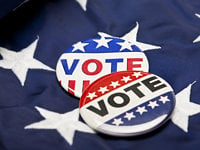 President-elect Donald Trump’s fabricated claims that undocumented immigrants have voted in numbers large enough to sway the popular vote undermines citizens’ trust in our democracy, undercuts the legitimacy of U.S. democracy abroad, and demonizes undocumented immigrants while diverting attention from legitimate concerns about our democracy, including money in politics, suppression of U.S. citizens’ right to vote, and gerrymandering.
President-elect Donald Trump’s fabricated claims that undocumented immigrants have voted in numbers large enough to sway the popular vote undermines citizens’ trust in our democracy, undercuts the legitimacy of U.S. democracy abroad, and demonizes undocumented immigrants while diverting attention from legitimate concerns about our democracy, including money in politics, suppression of U.S. citizens’ right to vote, and gerrymandering.
Rates of voter fraud of the type President-elect Trump is alleging are miniscule, ranging from 0.00004 percent to 0.0009 percent, according to a seminal report by the Brennan Center for Justice. However, by making unfounded claims of voter fraud involving millions of people, President-elect Trump sows deep distrust of our elections and challenges the fundamental right of every American to have a voice in our democracy through his or her vote. At best, his contention could result in voter suppression if enough people think the system is so flawed they decide not to participate. At worst, it damages the foundation of our democracy by calling into question the validity of our elections.
By spreading the myth of voter fraud, Mr. Trump also harms our efforts to lead by example and credibly support democratic values elsewhere. When we engage in diplomacy, global commerce or study and travel abroad, we should not be required to defend our democratic institutions against falsehoods promulgated by the incoming president. Moreover, by making the United States appear weak and dysfunctional, such claims undermine our credibility in countries or regions in which we want to have influence. Rather than stoking fear with unfounded assertions, we must focus on combatting the ways in which citizens’ voices are drowned out by wealthy special interests, citizens’ choices are limited by gerrymandered districts, and U.S. citizens’ votes are not counted because of unequal access to the ballot box.
Mr. Trump’s assertions about election fraud contain an undercurrent of anti-immigrant sentiment, bolstered by unsubstantiated claims he has made alleging that undocumented immigrants would vote in this election. Fomenting distrust of immigrants is at odds with our belief that the United States is at its strongest and safest when we welcome immigrants rather than villainize them. To suggest that immigrants violated our voting rules on a massive scale creates an us-against-them mentality and sets up excuse to create more onerous voter ID laws that disenfranchise citizens in the future.
Our democratic institutions can be made stronger. We must look to ways to ensure competition, ease voting for citizens, and create a system in which all voices have a chance to be heard. Our next president should embrace our democracy and unite us behind ways to make it more representative, rather than sow doubt and discontent with claims created out of whole cloth.
Lisa Rosenberg is senior director of public policy for NAFSA: Association of International Educators.
